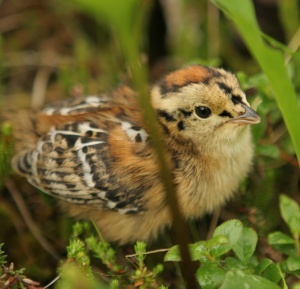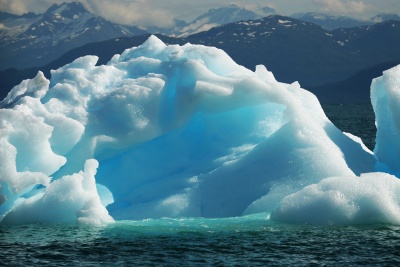In Alaska, I am often amazed. I am amazed by how many beautiful things I see, but I am even more amazed that I hardly ever see anyone else. I'm not complaining because I like the solitude, but I am amazed — people are missing out.
But I sometimes forget the effect I have by posting these articles. Several years ago, I couldn't believe no one else visited Geographic Harbor to see all the bears, and I said so in these pages. Now when I am there I see inflatable dinghies filled with tourists, and the possibility exists that it's my fault for mentioning the place by name.
The iceberg picture on this page is part of my effort to render in photographs what one sees with the eye in reality. I'll be describing the details, both about ice itself, as well as the photographic issues. The short version: the ice in Alaska is at times incredibly beautiful, as well as dangerous.
I could not believe all the things that broke on my boat this year. Part of this results from the fact that I am notoriously hard on hardware, like grounding my boat on a gravel bar while entering a lagoon, then shredding my prop while desperately trying to extricate myself. By the time I returned home, I had a baroquely complex list of repairs.
This year the weather in Alaska was very rainy. Old Alaska hands might object that this year was average, past years have been abnormally dry, and there's evidence for that view. But in August, both the highway and railroad between Anchorage and Fairbanks were washed out due to high rainfall, so there's some support for the idea that it was wetter than usual.
This year, it seems Alaska got a lot of rain that would ordinarily have traveled down to the "lower 48", and consequently the lower 48 states were abnormally dry this summer.
Notwithstanding the high rainfall this summer, the Great Spruce Die-off continues. Many parts of Alaska now have huge stands of dead spruce trees, a big fire hazard in dry conditions. When I first heard about this, I thought it was a simple case of the Spruce Beetle getting a lucky break from nature and invading a lot of trees at once. But as it turns out, the weather in Alaska has actually been much hotter and drier than in historical times, this weakens the trees, they are then killed by the beetles.
Global warming? Perhaps. I should say that many people claim global warming is upon us, it is dramatic and without historical precedent, it is caused by greenhouse gases, and we could shut off the warming by limiting our emissions. Everyone, that is, but scientists. For scientists, the jury is out and the evidence is not so clear-cut. On one hand, we humans really have significantly increased atmospheric CO
2 and other greenhouse gases, and recent years really have been warm compared to any years during which people have recorded weather directly, as well as being warmer than any time period for a very long stretch as recorded in glacial ice cores.
But as to "historical precedent," there have been a number of warm spells between the periodic ice ages, some hotter than the present. And it turns out that these warm spells seem invariably to be correlated with high atmospheric levels of CO
2 and other greenhouse gases.
We can reasonably conclude from this that we should expect warm weather when greenhouse gases increase (as they surely have). We can also say that there have been times in the past when both greenhouse gases and global temperature have increased for reasons other than human activity. What reasons are there, apart from fossil fuel burning? Well, widespread natural forest fires, volcanic activity, and high atmospheric water vapor (water vapor is a greenhouse warming contributor), to name just a few.
Some of these factors lead to the idea that global climate may be a chaotic system, meaning a system whose behavior cannot be predicted even in principle. Support for this idea can be found in the fact that water vapor increases when Earth's ice melts, and Earth's ice melts when water vapor increases.
None of this should be taken as a signal that we can abandon responsibility for our effect on the Earth, indeed we should pay close attention to how what we do affects our home. But there are many people presently racing ahead of the evidence, saying that science has proven something about global climate. The problem is that it's not so, and to take a firm position on the basis of today's evidence is to risk being undermined by tomorrow's.
I personally think a solution to the petrochemical greenhouse gas problem would be to burn less fuel, rather than try to control where the gases end up. The irony is not lost on me that I am writing this after traveling 6000 miles this summer in a boat that burns five gallons of diesel per hour (about the same as an SUV, per hour, but not per mile).
Those who have known me for decades are probably waiting for me to mention the population problem. I must say that, after trying to discuss population issues over many years with prospective parents to no measurable effect, I still feel strongly that this is the key problem we face. It is the root of all our other problems, but there's little point even mentioning it to people who might become parents, because each of them has a perfectly reasonable response.
A poor person of less-than-average intellectual gifts will reply that they might be unfairly singled out for "genetic counseling", when in fact, their children could turn out to offer something priceless to the world, because the traits of children are not strongly correlated with the traits of parents. And they are quite right.
A rich person of spectacular intellectual gifts will reply that, notwithstanding the fact stated above (children tend to randomly fall, some far from the tree), there is a small positive correlation between the traits of parents and children, and rich parents can more easily see to the needs of their children. And they are quite right.
A perceptive, sensitive, gifted person will reply that they are most likely to respond to an appeal to perception and sensitivity by limiting the number of their young, which would inevitably result in a less perceptive, sensitive, gifted future world, and they are quite right.
A dull, refractory, insensitive person will reply that dull, refractory, insensitive people are essential to a complex, modern society, otherwise who will haul the garbage and join the all-volunteer military services, and they are quite right.
My readers will by now have gotten the idea — there is no point advocating population control to individuals, because everyone has a perfectly reasonable explanation for why they are a special case.
But some people go beyond special pleading and show perverse ingenuity. During my callow, idealistic days I sat down with a young woman contemplating parenthood, and delivered my stock speech on overpopulation. She seemed very impressed. Her eyes grew large, as though her brain was being rewired on the spot. "This is important," she said breathlessly, "it's a serious problem." Over the next few minutes her eyes grew large and small, and her brows flew up and down like flags borne by a retreating army.
Finally she gave a sigh of obvious personal relief and said, "I am deeply impressed by this. I have never heard this issue before, and there is nothing quite so important. I want many more people to hear this idea. So ... I am going to have six children and tell each of them what you've told me."
Until that day I had thought I could teach people to limit their numbers. Instead I learned how to limit my expectations.
I hope you enjoy this article set.

 Share This Page
Share This Page
 Share This Page
Share This Page


 Share This Page
Share This Page